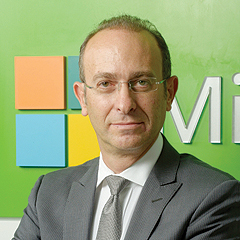 Charles Nahas,
Charles Nahas,General Manager,
Microsoft Kuwait
KUWAIT: Microsoft has a very close partnership with the Kuwait government for the last 15 years and it has been empowering the government in leveraging cloud and artificial intelligence. "We are also part of the 2035 Vision of the New Kuwait and our role is to empower the government in terms of their digital transformation and technology," said Charles Nahas, General Manager, Microsoft Kuwait, in an exclusive interview with Kuwait Times yesterday on the sidelines of 6th
E-Government Forum currently being held in Kuwait. Excerpts:
Kuwait Times: How is Microsoft helping Kuwait use ICT system to provide government services?
Charles Nahas: Thank you very much for the time. Microsoft has been in Kuwait for more than 15 years, and we have a very close partnership with the government of Kuwait throughout all these years. Our role is really to empower the government in terms of their digital transformation and in terms of technology - to achieve more. So, throughout these years we are enabling them to develop new services, and using the technology internally to improve their productivity, improve governance and so on.
Overall in general we are also empowering them in leveraging cloud and in particular artificial intelligence. This is probably the focus in line with our efforts, and in terms of supporting them to come up with new services to drive, and either offer to the citizens, or for them to be able to work together and achieve digital transformation for the government. I think that's a very important aspect and is crucial for Kuwait. It's also part of the 2035 vision of the new Kuwait. And this is where we're playing our role in supporting the government.
KT: See, ITA and Microsoft recently signed an MoU. How much progress has been made?
Charles: We have seen great progress in this area. This MoU was signed in August this year under the patronage of His Highness and we're very excited about this and its components. We're going to partner with CITRA to provide the government with technologies around blockchain, IOT, cloud, cybersecurity and artificial intelligence. And so, we have a number of elements that we are working on with the government. We already have had a number of follow up meetings and actions in place. One of the upcoming actions that will be announced shortly is a workshop for different government entities to train them on how to leverage artificial intelligence in their departments.
KT: How is Microsoft working with Kuwait in the fields of Smart Cities and Artificial intelligence?
Charles: In terms of Artificial Intelligence, what we're trying to do is a number of things. We're trying to first of all, explain what artificial intelligence is and what it can do for governments and organizations. And what we are also trying to do - is enable the government and people to understand AI, by training them on how to use AI tools. We are also going to share our experiences with AI in government from across the world, and show what other governments have achieved using AI; but more importantly we are going to support them on using AI, which will enable different ways for them to leverage it and understand best how it works and function in their field. This way, they will be the in the best position to really leverage that. From our perspective, it's about providing them the infrastructure, and the support. And as you may know, we have recently announced that we will be building two datacenters in the Middle East. This will be able to provide the capabilities, because AI is basing its functions in the cloud network.
KT: What obstacles does Kuwait face in implementing the eGovernment system to eliminate paper, and what is Microsoft's role in that?
Charles: What we see is that there is still a lot of potential for eGovernment services in Kuwait. For us, it's really about defining strategies for the eGovernment and after that defining the components that's going to be needed for these services. And then, providing the different systems for this. It's not only Microsoft, I believe, all companies in the IT sector will come together and provide these capabilities. The way we are approaching this is by working closely with agencies such as CAIT and CITRA to come up with an overall strategy. We're also working with other government entities such as: Ministry of Health, Ministry of Finance, Ministry of Awqaf to understand in terms of what they need for eservices, and the capabilities they require to fuel their own digital transformation. And then, this all happens in line with the overarching strategy of the government that we are supporting the central entities on.
KT: Anything more to add, to say?
Charles: We're very excited to participate in the eGov event. We've been participating every year for the past six years. This is a great opportunity for us to share in terms of what can be done in the government sector. We also have a number of Microsoft speakers that are going come and part knowledge at Egov.
We're also bringing a lot of experiences from across the world in government, and make them available to work with the Kuwait government in their digital transformation journey and we're very passionate about that. We are also excited about the opportunity that AI brings - it is a revolutionary technology that will empower the government in terms of transforming and providing leading services for its citizens.










